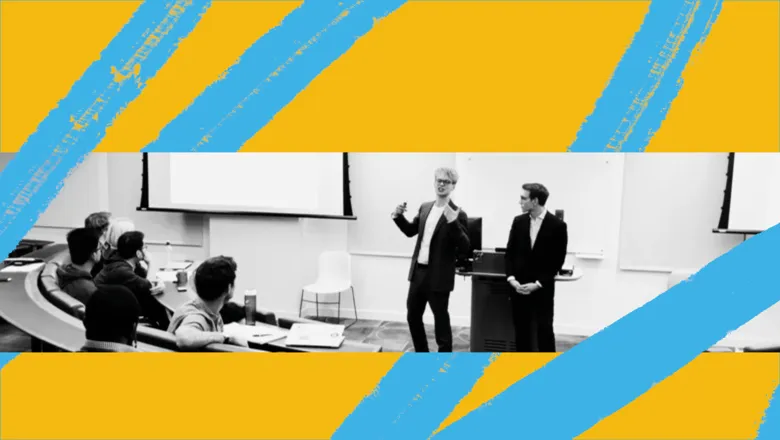Tobias Whetton, CEO and Founder of Supernotes, an app that super-charges productivity, shares his top tips for beating procrastination.

Procrastination is a repeat offender during student and working life, with over 80% of students admitting to this bad habit regularly. However, it is more than just a habit, costing the UK economy a staggering £345 billion every year. But what exactly is procrastination? Dr Neil Fiore, a leading psychologist, sums it up very well:
"Procrastination is a mechanism for coping with the anxiety associated with starting or completing any task or decision"
The key word here is mechanism - procrastination is a voluntary behaviour. You are consciously aware of it, but are reluctant to change your attitude, and would rather watch another five episodes on Netflix.
In my last year of study at King's I could no longer afford to procrastinate. I had to juggle my responsibility as president of the Mountaineering Club, finishing my degree and growing my startup, Supernotes, the collaborative knowledge platform. My co-founder and I were fascinated by the behaviour behind learning, and over the years we have spent hundreds of hours researching the most effective learning practices. From this I have established an incredible toolkit on beating procrastination, and frequently talk in Universities around the UK to help other students do so as well.
Here are my top five tips to help you overcome the urge to procrastinate, and become a more productive and efficient learner!
1. It's your choice
The most common phrase I hear students say is "I have to hand in my work in a few weeks". However you don't have to do anything! You have chosen to come to University, and thereby chosen to receive coursework and deadlines. Repeatedly saying "I have to" and "I need to" is essentially telling yourself "I have to but I don't want to", clouding your mind with a sense of ambivalence and justifying your procrastination.
Avoid this negative outlook, identify when you use "have to" and replace it with "hope to" and "want to" - a statement of choice and empowerment.
2. Treat deadlines with respect
A deadline is due in a finite amount of time, so treat it that way. Your coursework isn't due in a "few days" but "63 hours". A recent study by Lewis and Oyserman found that by manipulating the time metric and thinking of it in a smaller unit of time, participants were up to 4x more likely to take action sooner! ∴ Less likely to procrastinate and end up cramming!
So next time you receive a deadline, note down the exact date in a calendar and calculate exactly how far away it is. Think of time in an exact measure of days and hours, not months and weeks.
3. Break your workload down
Writing a long essay is never as appealing as watching a 30 min Netflix episode. The main reason for this is 'present bias'. We crave instant gratification, often prioritising tasks that will give an immediate reward and postpone potentially more important but strenuous tasks because the reward will be obtained in the distant future.
A great way to overcome this hurdle is to immediately start a task when you receive it, even with prior knowledge that you won't have the time then to complete it. In fact, interrupting yourself from completing a task is actually better as you harness the Zeigarnik effect. Named after the psychologist and psychiatrist Bluma Zerigarnik, she found that people who were interrupted from completing a task were twice as likely to complete it.
So next time you receive a large task, start it immediately and spread your workload over small intervals. You will find yourself with a greater desire to complete it.
4. Work together on different tasks
Your friends and fellow students are instrumental in helping you achieve your goals - but often you might find yourself being even more unproductive with your classmates. Why is this the case? This occurs since you are most likely to work with classmates who "think in the same way" and have the "same task" to complete as you. Since you are both carrying out the same task, you will often hit the same hurdles since you approach a problem in the same way - and then get stuck and distract each other.
An easy way to overcome this is to do "different task" when working together with students who have the same mindset you - you will find yourselves a lot more focused and able to help each other without distraction. Or finding students to work with on the "same task", who "think differently" to you, helps you find a new perspective on problems you encounter making them more interesting and are more likely to retain your focus. Peer learning has been proven to be one of the most effective ways to learn - just remember collaborating is not the same as collusion!
5. Stay Positive
It's exam season, and you are realising your anti-procrastination strategies haven't turned out as well as you had hoped - the first exam didn't go to plan. At this point, it can be very tempting to be hard on yourself, however that feeling of guilt actually acts as a deterrent to take action, and is more likely to lead you down a path of procrastination.
A study conducted on a sample of first-year undergraduates found that those students who forgave themselves for procrastinating while preparing for their first exams were less likely to procrastinate in studying for the second exam.
So practice some self-love, allow yourself to make mistakes and focus on the future. Tomorrow is a new day!
If you have found any of these tips useful, send us a message on social media, @supernotesapp. If you would like to try a great new way to take notes and share them with your friends at university, check out Supernotes - it was built with learning in mind!






